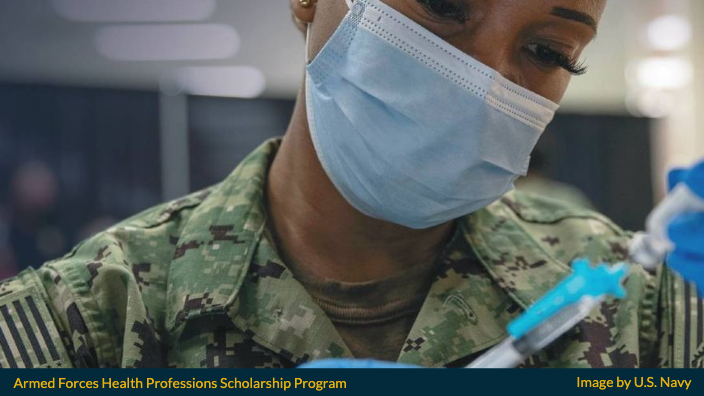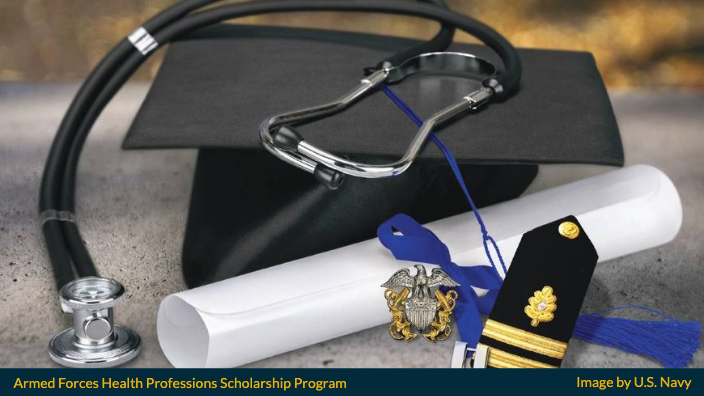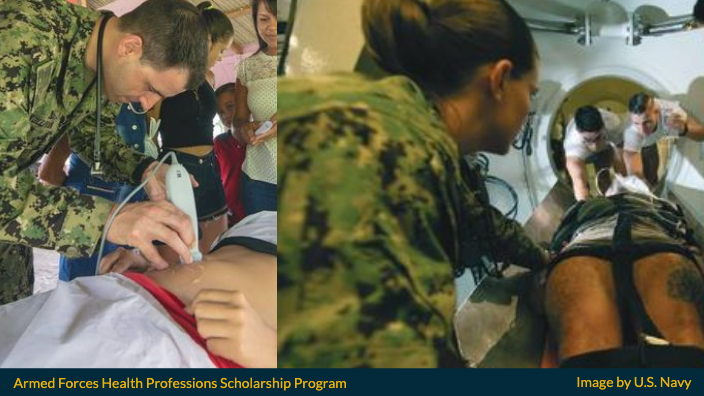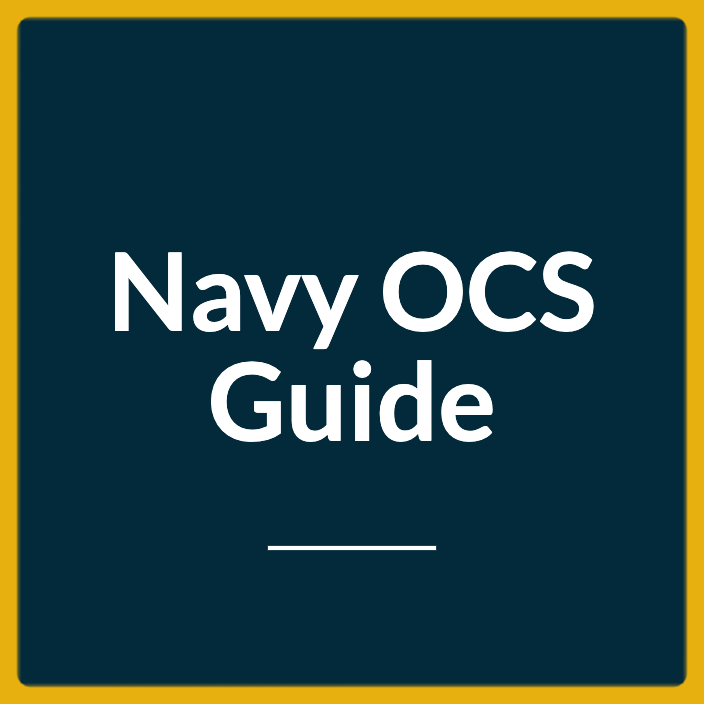Last Updated on March 4, 2024
This guide provides helpful information for those who are looking to become a healthcare provider in the Navy through the Health Professions Scholarship Program during Fiscal Year 2024.
This program involves many detailed requirements and is generally very competitive.
So, let us jump right into the details.
What is the HPSP?
The Armed Forces Health Professions Scholarship Program (HPSP) is a Department of Defense program that provides financial support and incentives to help students navigate the unique and challenging opportunities of medical, dental, and allied health sciences schools.

If you are already enrolled in or plan to enroll in school to become a physician, dentist, clinical psychologist, physician assistant, or optometrist, the HPSP will cover your educationally related tuition and costs for up to four years of school and will give you a monthly stipend.
The Navy reimburses for all professional school-required materials and equipment.
HPSP provides complete tuition assistance, a monthly stipend over $2,300, and a $20,000 signing bonus for a three- or four-year commitment to serve as a Naval physician.
This program has a potential worth of well over $300,000 throughout the duration of a four-year professional school degree.
After graduation, you will become a commissioned officer and join the Navy’s active-duty force.
Along with superior training programs and board pass rates that rank among the highest in the country, you will earn full officer salary and benefits that much surpass civilian residency pay.
Veteran benefits, such as the Post-9/11 GI Bill, healthcare, and other special programs, can motivate applicants to join the military.
In exchange, you promise to spend a minimum of two years on active duty or one year of scholarship for every year of service, whichever is longer.
This program is like the Health Services Collegiate Program (HSCP) because it provides scholarships to students in the medical field, and their payback service obligation is similar.
However, HPSP differs from HSCP in many ways. Here are some examples:
- HSCP is an exclusive Navy program. This means that HSCP is not available to those who seek a subsequent commission in another branch of military service. The Department of the Navy funds the HSCP and is therefore only available to those who wish to serve in the Navy, whereas the HPSP is a Department of Defense program, so its participants may join another service after school.
- In HPSP, students attend their designated schools as civilians who receive full tuition and fees and receive a monthly stipend. On the other hand, HSCP students do not receive full tuition and fees, but receive full military pay and benefits while attending school.
Nonetheless, the total monetary value of both programs is similar. The benefits are just delivered differently.
Summary of Benefits
Below is a list summarizing the benefits of HPSP:
- Covers 100% of tuition and school fees (up to four years)
- Book, Supply, and Equipment Reimbursement
- Annual Training for HPSP (45 days)
- A monthly stipend of $2,391.60
- A $20,000 HPSP Signing Bonus is available to medical and dental students
- Comprehensive medical and dental insurance
- Continuing medical and dental Education
Why Choose the Navy?

Each potential candidate should carefully assess the benefits of each service and the possibility of applying to the Uniformed Services University of Health Sciences (USUHS).
The Navy provides several chances in aviation and submarine medicine, as well as typical medical officer jobs aboard ships or with land-based forces.
It is useful to speak with individuals about their experiences and impressions of each service’s culture.
A service culture that is best compatible with your unique personality is critical to professional satisfaction.
The Navy provides all medical treatment for the Marine Corps, so anybody interested in serve as a doctor with the Marines must go through Navy Medicine.
The possibility to deploy on humanitarian missions to South America and Southeast Asia aboard US Naval Hospital ships is a major draw for Navy Medicine, as is the predominance of duty stations in coastal cities.
Navy Medicine Duty Stations
Those who choose to become Naval Officers will enjoy the coastal duty stations of the U.S. Navy.
Internships and residencies in Family Practice are available in Washington, DC; Camp Pendleton, CA; Camp Lejeune, NC; and Jacksonville, FL.
The remaining internship and residency programs are based in San Diego, California; Portsmouth, Virginia; and Washington, DC.
Below are the duty stations available in Navy Medicine:
Below are the duty stations available in Navy Medicine overseas:
Applying for the Navy HPSP

The ideal time to apply for a four-year scholarship is the fall before your professional school year.
Students in medical, dental, or optometry school should apply for scholarships as soon as possible because applications are accepted all year round and scholarships are granted regularly.
The application process takes 12-16 weeks.
You can apply before getting accepted to medical or dental school, but you must get accepted before getting a scholarship.
Basic Qualifications
Citizenship
Applicants must be U.S. citizens.
Age
Applicants must be commissioned by the time they reach the age of 42. The board will handle waivers on a case-by-case basis.
Age Waiver
When a candidate is beyond the minimum age for commissioning but possesses an extraordinary record or showed skill set desired by the Navy, a waiver may be granted in restricted numbers.
When determining whether to grant an age waiver, a heavy emphasis will be placed on understaffed specialties and those with a history of failed recruiting targets.
Applicants between the ages of 42 and 47 will be evaluated for an age waiver.
Physical
Applicants must meet Navy physical and medical standards under the Manual of the Medical Department, Chapter 15.
Education
Applicants must be accepted or enrolled at an approved institution in the United States or Puerto Rico, and in a health-related course of study.
Undergraduate coursework must have a cumulative GPA of 3.0 on a 4.0 scale.
During the program, the officer must remain a full-time student.
A curriculum plan showing course prerequisites and expected completion date will be provided with the application and revised as instructed by the Bureau of Medicine and Surgery (BUMED).
Participants may be removed from the program by the office of the Chief of Navy Personnel if they cannot meet academic or military criteria.
Upon conclusion of each academic term, official transcripts may be requested for submission to BUMED.
Failure to disclose entire academic transcripts or any proof of tampering may cause dismissal from the program.
Medical Corps (MC)

The Navy Medical Corps (MC) relies heavily on this program as the major source of admittance for Navy physicians.
The Commander, Navy Recruiting Command (CNRC), the MC Officer Community Manager (OCM), BUMED, and the Officer of the Chief, Medical Corps, collaborate to optimize potential medical department physician gains via this initiative.
Undergraduate coursework must have a GPA of 3.2 on a 4.0 scale.
Applicants must have a minimum MCAT score of 500, with 124 in each of the four subsections.
Waivers will be handled case by case.
During the program, the officer must remain a full-time student.
Prior to graduating and going to active-duty, applicants must take and pass the United States Medical Licensing Examination (USMLE) parts I, IICK, and IICS or the Comprehensive Osteopathic Medical Licensing Examination (COMLEX) levels I, II CE, and II PE.
Students must pass the USMLE or COMLEX Part I before the start of the third year of medical/ osteopathic school’s academic curriculum.
Failure to pass these examinations after two attempts or to obtain a valid state license following internship completion will cause redesignation and completion of incurred active-duty service obligations in another community or separation from the United States Navy and recoupment of Navy expenditures under the terms and provisions of the service agreement and applicable Navy regulations.
Dental Corps (DC)
The Navy Dental Corps (DC) relies heavily on this initiative to recruit Navy dentists.
The CNRC, DC OCM, BUMED, and the Officer of the Chief, Dental Corps, collaborate to optimize potential dental officer gains via this program.
Prior to graduating and reporting to active duty, applicants must take and pass Parts I and II of the National Board Dental Exam (NBDE).
NBDE part I must be taken and passed during the third year of the dentistry school’s academic program.
Applicants must complete part II of the NBDE throughout their fourth-year academic curriculum in December.
After two attempts, failure to pass these tests may cause separation from the program. Failure to obtain a valid state license within one year of reporting to active duty will cause redesignation and fulfillment of incurred active-duty service obligations in another community, or separation from the United States Navy and recoupment of Navy expenditures under the terms and provisions of the service agreement and applicable Navy regulations.
Applicants from jurisdictions that need a five-year residency prior to licensing will be granted an additional six months.
Medical Service Corps (MSC)
The Navy Medical Service Corps (MSC) uses this specialty-specific program as one of the major sources of officer accessions.
The MSC OCM, in collaboration with BUMED and the Office of the Chief, Medical Service Corps, evaluates and determines which MSC specialties are qualified for this program, as specified in a memorandum to CNRC.
This program provides a pipeline for the physician assistant, optometry, podiatry, and clinical psychology specialties.
At the moment, online degree programs are not permitted.
Physician Assistant
Applicants must be enrolled or approved for admission to an accredited college, university, or institution of study to pursue a master’s degree in Physician Assistant studies.
Applicants must be enrolled in a program certified by the Accreditation Review Commission on Education for the Physician Assistant.
To fit the conventional two-year curriculum, degree requirements must be completed within 12 to 24 months after enrollment.
The benefit may be extended up to 30 months to support academic programs that last 30 months.
The professional review board will determine the length of the contract prior to the applicant’s admission to the program.
Prior to enrollment, applicants must have an authorized degree or course of study completion plan in place to establish the expected graduation or completion date.
Prior to going to active duty, applicants must pass the Physician Assistant National Certification Exam (PANCE).
Failure to pass the PANCE test after two attempts will cause separation from the U.S. Navy and recoupment of Navy expenses under the service agreement’s terms and restrictions and relevant Navy rules.
Optometry
Applicants must be enrolled in an approved optometry school accredited by the American Optometric Association’s Council on Optometric Education.
Prior to going to active service, participants must be licensed by passing parts I, II, and III of the National Board of Examiners in Optometry.
Newly appointed Navy optometrists must earn their license within one year of entering active service.
Podiatry
Applicants must be enrolled in a program approved by the American Podiatric Association’s Council on Education.
Additionally, applicants must successfully complete part I of the examination before the start of the third-year academic curriculum and submit their results to the AFHPSP program manager’s office by 15 September of the third-year academic curriculum.
By 15 October of the fourth year, part II of the test must be taken and passed.
After two attempts, failure to pass these tests may cause separation from the program. Failure to obtain a valid state license within one year of reporting to active duty will cause redesignation and fulfillment of incurred active-duty service obligations in another community, or separation from the United States Navy and recoupment of Navy expenditures under the terms and provisions of the service agreement and applicable Navy regulations.
Clinical Psychology
Applicants must be enrolled in an American Psychological Association-accredited doctorate program (Ph.D. or PsyD) in clinical or counseling psychology and have successfully completed at least one year of the program.
To be considered for a scholarship, applicants must submit a letter from their training director stating that they are in good standing in their PhD program and their graduate school transcripts for consideration by the clinical psychology specialty leader.
Failure to submit transcripts or to progress through the clinical training program may cause program disqualification.
Following completion of their PhD program, applicants must take part in the Navy’s internship program.
Applicants must complete the licensing process within 18 months of completing their 12-month internship.
Failure to obtain a valid state license within 18 months of internship completion will cause redesignation and fulfillment of incurred active-duty service obligations in another community, or separation from the United States Navy and recoupment of Navy expenditures under the terms and provisions of the service agreement and applicable Navy regulations.
Nurse Corps (NC)
This program is used by the Navy Nurse Corps (NC) for graduate level nursing studies.
Students with a non-nursing bachelor’s degree who intend to pursue a nursing degree are eligible for direct admission Master of Science in nursing (MSN) degrees.
The program must be finished within 24 months after its commencement. At the moment, online degree programs leading to a direct entry MSN are not permitted.
Applicants must be enrolled full time in or admitted to a college or university and its nursing school that offers a graduate degree in nursing approved by the Accreditation Commission for Education in Nursing or the Commission on Collegiate Nursing Education.
Upon graduation, direct entry MSN students must obtain and maintain a valid, unrestricted license to practice as a professional registered nurse from a state, territory, or the District of Columbia that is based on the National Council Licensing Examination – Registered Nurse (NCLEX-RN), administered by the National Council of State Boards of Nursing.
The NCLEX-RN examination must be taken as soon as possible after graduation and prior to reporting for active duty.
Navy HPSP Service Obligation

Appointees incur a one-year obligation for each year of participation in the program.
For periods less than a year, each additional six months of participation adds six months.
Periods of 15 days or more are considered a six-month period.
Appointees who are required to serve less than three years on active duty will be required to serve a minimum of three years on active duty.
Obligated service under this program is besides any other active-duty service requirement that remains unmet.
All Naval Officers have an eight-year service commitment. Time not spent on active duty will be spent in the Selected Reserves or the Inactive Ready Reserves.
Members must sign a written agreement stating that they will:
- Upon completion of the HPSP, accept an appointment in the appropriate officer corps, USN, on the active-duty list.
- Agree to fulfill any active-duty requirement resulting from participation in the HPSP or any portion thereof.
- Agree to fulfill any active-duty requirement resulting from voluntary withdrawal or shortcoming in behavior or studies by accepting a position as a commissioned officer, unrestricted line, USN on the active-duty list, if offered. If the member is not qualified for reappointment, he or she shall be responsible for any fees paid because of participation in the HPSP. The Secretary of the Navy may waive this rule if doing so is in the government’s best interests. Members who are not eligible for reappointment will undergo administrative separation.
- Acknowledge that they are aware of the criteria for licensure and certification. The officer is responsible for the cost of keeping a license to practice.
- Acknowledge that they will be promptly summoned to active duty upon completion of course requirements.
Annual Training
Members of HPSP are required to serve 45 days on active duty each year while in student status.
Unless current legislation requires different, pay and allowances for the 45-day active-duty training term will be in the grade of O-1.
For pay purposes, past military service longevity is credited.
Uniforms must be worn when on active duty at any military installation.
More Information About the Benefits
Contracts with educational institutions will cover tuition and other approved expenses for each participant in the program. BUMED will handle the contracts.
Members will be reimbursed for needed textbooks, equipment, and supplies.
All reimbursement claims must include dated, itemized purchase receipts and certification from the educational institution.
Reimbursement will be restricted to expenditures that would be spent by non-members of the program at the same institution. State and municipal taxes are not refundable.
While on inactive duty, members shall receive a monthly stipend at the amount set yearly by the Assistant Secretary of Defense (Health Affairs).
The monthly stipend will begin on the later of the following three dates, collectively referred to as the benefit start date (BSD):
- the day the member takes the oath of office
- the date the member signs the program agreement/contract
- the academic year’s start date
Members who become eligible for program benefits during an academic session will be charged for the whole academic session. The BSD establishes the stipend’s start date.
Payment of the stipend will continue until the member completes the authorized course of study, unless the member is suspended or dropped from the course of study.
Payment of the stipend will cease upon completion of the academic program if that date is over 45 days prior to graduation.
Receiving the stipend does not restrict the member from accepting money from the civilian education/training institution, so long as the member does not incur any service obligation in exchange for the funds upon graduation.
Unless current legislation requires differently, pay and allowances in the pay grade O-1 shall be paid during periods when the officer is on active duty for training.
For pay purposes, past military service longevity is credited.
Additional Medical School Information
Your medical school experience will be like that of your peers, with the exception that you will apply for the military match during your fourth year of school.
You are almost certainly going to be accepted into a military training program. A variable percentage each year may defer military service to complete a civilian residency.
During your first year of training, you will be able to apply for either straight-through residency training (equivalent to a civilian residency) or a post as a General Medical Officer (GMO).
Those selected for straight-through residency training will begin fulfilling their service obligation immediately upon graduation from residency.
Individuals who volunteer to serve as a GMO will have their time spent as a GMO used against their training obligation.
While around 75% of GMOs choose to seek military residence upon completion, approximately 25% fulfilled their HPSP service obligation and separated from the Navy.
Those who finish a Navy Residency fulfill their service obligation as a staff physician and then decide whether to remain on continued service.
Non-Selection
Regrettably, only a small percentage of graduating medical students (civilian and military) are picked.
Fortunately, the Navy allows for reapplications in any discipline, and those who thrive as a GMO or staff physician frequently succeed in reapplication.
No Opening for Specialty of Choice
Medical officers who discover an interest in a specialty that is misaligned with the Navy’s mission often complete their commitment and are extremely competitive candidates for the civilian match.
There are very few fourth-year medical students who can match your experience.
General Medical Officer
General Medical Officers or GMOs are medical officers who have graduated from medical school, completed an internship, and earned a medical license to practice medicine in the United States.
Typically referred to as general practitioners, these physicians serve in the Flight, Marine Corps, Undersea/Dive, or Surface Warfare communities.
They oversee all aspects of medical treatment, including emergency care, health maintenance, and first-line trauma management.
It encompasses the responsibilities associated with maintaining a small clinic, such as supply management, pharmacy development, and staff training.
You will be assisted by many highly qualified Corpsmen as you head your medical department.
Flight Surgeons complete an additional six months of flight school and aviation physiology training to qualify to care for pilots and others of the aviation community.
As a flight surgeon, you may be assigned to either fixed-wing or helicopter units in the Navy or Marine Corps, sea-air rescue units, or even the illustrious Blue Angels.
Undersea Medical Officers (UMO) receive extra training. They complete radiation health and hyperbaric medical training at Panama City Beach, Florida, and then qualify as United States Navy Divers.
UMOs are assigned to Navy SEALS, Explosive Ordnance Disposal (EOD), and submarine squadrons.
Additionally, a few billets for diving research and instruction are available.
UMOs do not deploy with submarines; rather, they supervise the medical care given by highly trained Independent-Duty Corpsmen (IDC) who do.
Other General Medical Officers are assigned to the Marine Corps, the Surface Navy, or to a ship or shore command.
You are frequently the senior medical authority wherever your ship or Marine unit deploys, and you are a critically important element of the combat team.
Annual Training
Each year of participation in the HPSP, participants are entitled to 45 days of Annual Training (AT).
Only one AT may be taken each 12-month period, calculated from 1 October to 30 September, i.e., the fiscal year of the Department of Defense.
During an AT period, stipend payments cease, and the participant is compensated with active duty pay and benefits commensurate with his or her rank.
All orders for students are generated by BUMED Accessions staff using information submitted via the Annual Training Order Request Form.
Annual Training Types
Officer Development School (ODS)
Attendance at ODS is not needed if a person has prior Navy commissioned service, has attended the Naval Academy, or has taken part in Navy Reserve Officers Training Corps (NROTC).
Navy ODS is mandatory for all other participants, even those with Navy enlisted or commissioned service from another military branch.
Your initial AT should ideally take place at this five-week program in Newport, Rhode Island.
ODS teaches fundamental military skills, proper uniform wear, and military etiquette.
This is often completed before enrolling in professional school. It may, however, be taken at any time and must be completed prior to being called to active duty.
If you want to attend ODS after graduation, your detailer will include it in your orders to active service.
Clinical Clerkship
Clinical clerkships are rotations at a Navy hospital or clinic during which the trainee takes part in instructional and patient care activities under the supervision of a Navy physician with appropriate credentials.
Clinical clerkships typically last between two and four weeks and give a chance for trainees to gain knowledge of the Navy’s medical system, meet program directors and department heads, and interview for future internships.
The Accessions AT staff fulfills the remaining 45-day requirement through School Orders, which allow students to return to school and resume their daily routines while still receiving active duty pay and benefits.
Clerkships are typically taken at the conclusion of the junior year and the start of the final year of study.
School Orders
During the first several years of education, it is not always convenient or viable to take a month away from school.
Rather than withdrawing from school, the HPSP participant may ask for “School Orders.”
While on “School Orders,” the student stays enrolled in school and follows his or her usual schedule, while receiving full active duty pay and benefits at the proper rank.
You may not go abroad or take vacations while under school instructions, but you may still take weekend getaways within 300 miles of your school.
While on School Orders, there is no requirement to wear a uniform or check into a military institution.
Research and Operational Medicine Clerkship
Clerkships in research and operational medicine are other opportunities to engage in AT if ODS is not an option or if you are a Naval Academy graduate, a former naval officer, or have NROTC and have an extra AT to spend.
AT sessions are planned for a maximum of four weeks and are used for training that needs to travel to a place.
The remaining 17 days of AT will be marked as school orders, during which you may receive your active duty pay and benefits while continuing to attend your regular school routine.
HPSP Frequently Asked Questions
How does the payback work?
You must apply for military residency training through the graduate medical education selection board process, often known as military match.
There are occasional openings for civilian residencies in understaffed specialties.
Your obligation following residency training will be defined by your HPSP contract.
How do I pursue my specialty of choice?
Navy Graduate Medical Education (GME) is a meritocracy that evaluates applicants on their achievement in medical school, internship, and residency, as well as their board scores, research, operational experience, and other intangible indicators of leadership ability.
The Graduate Medical Education Selection Board (GMESB) meets annually to rate all applications.
The highest-ranked applicants are assigned to their desired specialty and location. Each December, the findings of this list are made public (known as the Military Match).
What is the Military Match?
Both civilian and military residencies are competitive, with students from all medical schools competing for a few positions.
Whether military or civilian, this procedure may be extremely competitive, with few assurances, even for the most accomplished medical students.
The “military match” takes place in December, while the civilian tournament takes place in the spring.
This enables HPSP students to apply for the Navy Active-Duty Delay for Specialists (NADDS) program, which enables them to finish a civilian residence.
As with all residency matching programs, each program has a maximum number of participants and only those members with the most competitive applications are chosen.
Can I sub-specialize?
This is determined by your specialty and the timing.
It is impossible to foresee the Navy’s demands, and the Navy’s needs affect what and how many people we teach.
In general, the closer your specialization is to the Navy’s mission and needs, the more likely there will be a chance to sub-specialize.
Can I be called into active duty while in school?
No. While in medical school, your goal is to become the greatest doctor possible, and the HPSP office works diligently to ensure that your service duties do not obstruct your study.
Your principal responsibilities are to maintain an annual health certification and to take part in one six-week Active-Duty Training (ADT) session per year.
What is Active-Duty Training (ADT)?
As an HPSP student, you are a reservist in the Navy. As such, you must spend six weeks of active service each year.
Because your major obligation is medical school, the HPSP central office will work with you to choose how you wish to use your ADT times to meet your personal and educational goals.
The most typical approach is for students to finish Officer Development School (ODS) during their first ADT term.
Most will accept school orders during their second ADT term, with the sole purpose of remaining in their immediate region and studying for their board exam.
You will get active duty pay and allowance to stay at school and study.
During the early months of their fourth year of medical school, students use their third and fourth ADT periods to go to military hospitals and interview or audition rotations.
The bonus is that, besides active-duty salary, travel, accommodation, and food expenses will be covered while on ADT.
What is Officer Development School?
Navy Bootcamp is designated for the enlisted indoctrination process. Medical Officers undergo a totally distinct indoctrination procedure.
Officer Development School (ODS) is in Newport, Rhode Island. Five weeks of training is substantially less demanding than bootcamp.
ODS should serve as a springboard for your officer growth and to familiarize you with the norms, courtesies, and traditions of naval service.
What are the specialty training opportunities in Navy Medicine?
Each year, the Navy takes strategic judgments about the number of personnel it needs to train in each specialty to fulfill all areas of our mission.
The Navy is similarly competitive in narrow and highly competitive civilian disciplines, such as dermatology.
It is critical to recognize that no recruiter can ensure your career success.
Opportunities and competition for specializations in the Navy are equivalent to those in the civilian sector, and the only way to ensure your candidacy is to be the most competitive applicant possible.
Because of NADDS, HPSP students interested in certain areas may seek authorization to pursue a civilian residence and then enter active duty.
These are intern options only; during your intern year, you will apply for specialized residencies.
What else does Navy Medicine offer aside from traditional medical practice and training?
Navy Medicine takes pride because current medical officers serve in the Congress, the White House Medical Unit, and the Centers for Disease Control and Prevention (CDC).
Navy Medicine has also proved to be an effective conduit for the country’s Astronaut program.
Medical Officers who gain a Global Health Engagement (GHE) credential may also be selected to serve as health advisers to a variety of international organizations, including NATO, or as Health Attaches to U.S. Embassies worldwide (including Hungary, Vietnam, and New Zealand).
Additionally, there are available positions with some of our country’s most elite military units.
Apart from warfighting and defending the freedom of the seas, the Navy is critical to our National Strategy of alliance and partnership building.
The USNS Comfort and USNS Mercy are deployed to Southeast Asia and South America to offer medical help in the aftermath of natural catastrophes and to underserved people.
While most positions focus on patient care, several opportunities exist within Navy Medicine to pursue research interests, including at the Navy Medical Research Center in Silver Spring, Maryland, or at one of the many research units throughout the world, including Africa, South America, and Southeast Asia.
Additionally, you are encouraged to engage in research activities as part of your daily job.
How do I become competitive in the HPSP selection board?
Selection committees are particularly interested in an applicant’s academic, medical, and professional capabilities, as well as evidence of a commitment to service.
They are held twice a month and around 85% of candidates receive a scholarship.
Successful HPSP applicants typically have a GPA of 3.65 and an MCAT score of 507.
When should I apply for the HPSP?
You do not need to be accepted to medical school to apply, but you must be admitted to an accredited United States Medical School to earn the scholarship.
Scholarships are offered on a first-come, first-served basis, with most applicants for four-year scholarships coming in early spring (process started much beforehand).
Scholarships for three years are often offered during the first year of medical school and typically expire in the spring.
How do I apply for the HPSP?
To begin the process, contact a Medical Officer Recruiter.
The application process starts with the review of your current resume or curriculum vitae, so please have this ready.
Please keep in mind that there are several types of recruiters, and while many are well knowledgeable about Navy procedures, many are unaware of the intricacies of physician training.
Email MedicalVIP.fct@navy.mil to get linked to a Medical Officer Recruiter in your area.
The recruiter will walk you through the application process, which might take many months to complete.


